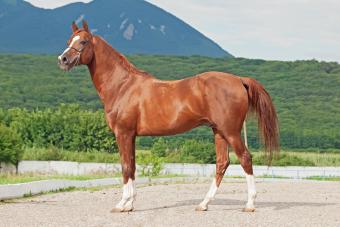
The lifespan of a horse is anywhere from 25 to 30 years, though some can live to be 40 years old with the right care. How long a horse will live depends on their breed, size, diet, and health condition, among other factors. While most of these factors are out of your control, there are ways you can help your horse enjoy a full, long life.
Factors That Impact a Horse's Lifespan
There are several elements that influence the life expectancy of a horse.
Size
Similar to dogs, smaller horses tend to live longer lives than those that are larger in stature. A pony, which is defined as a horse that's shorter than 14.2 hands (58 inches), can easily live to be 35 or even 40 years old. Arabians are another small breed at around 15 hands, or 60 inches tall, that reportedly live longer lives. Draft horses, on the other hand, are some of the largest horses and may not be as long-lived.

Breed
A horse's breed can contribute to their life expectancy. Much of this is related to size as well as genetics. Some breeds have a higher incidence of inbreeding, which makes them prone to genetic diseases. This is the case with Friesian horses, who have an average lifespan of only 16 years.
Breeds known for their longevity include Quarter Horses, Icelandic horses, Arabians, Haflingers, and Appaloosas. Some members of these breeds have been known to live into their 30s or even their 40s.
Diet
Nutrition is incredibly important to the overall health and longevity of a horse. Without a proper diet, horses are at risk for illness, hoof abnormalities, and life-threatening digestive problems, such as colic. While underfeeding can leave horses malnourished, overfeeding can also lead to obesity-related health issues.
Activity Level
A horse's workload also impacts their lifespan. Those used for work -- for example, farming, pulling buggies, competitive events, or riding lessons -- tend to deteriorate more quickly than those with lighter activities or no workload. Intense exercise like racing can put horses at risk for injury and even death.
Environment
Although many horses spend time in stalls, those kept in small enclosures may have shortened lives. Poor ventilation can affect their lungs and decreased activity can increase risks of developing colic. Any stall should be large enough to allow a horse to lie down comfortably to sleep. If they can't get adequate lateral REM sleep, a horse could potentially fall into a deep sleep while standing, which could lead to collapse and severe injury.

The climate can also have an impact on horse health. Horses in desert environments are at higher risk for harmful dehydration and sand colic. Alternatively, those in moist locations can be prone to infections of the hooves or "rain rot," a bacterial skin condition.
Health Care
Horses can suffer from several different illnesses, but adequate medical attention can help to extend their life. Measures like immunizations, dewormings, regular hoof maintenance, dental care, and proper nutrition are essential for disease prevention. Horses without adequate care risk living shorter lives.
Genetics
Genetics also play a role in how long horses live. Inherited genes and gene mutations can put individuals at risk for certain conditions, such as malignant hyperthermia or hyperkalemic periodic paralysis. Somatic gene mutations (those that occur after a horse is born) can cause cancers or other life-shortening diseases.
Oldest Known Horses
Of course, there are always horses who defy the odds. Some horses have been known to live well past the 25- to 30-year average and even into their 60s!
- Old Billy (62 years old): Old Billy, a horse of unknown pedigree who hailed from Lancashire, UK, lived to be 62 years old (from 1760 to 1822). He holds the Guinness Book of World Records record as the oldest known horse to date.
- Sugar Puff (56 years old): A small Shetland-Exmoor pony named Sugar Puff earned the title of the world's oldest pony. She lived in West Sussex, UK, until her final day in 2007.
- Shayne (51 years old): Shayne, a beautiful Irish Draught and Thoroughbred cross residing at a horse sanctuary in Essex, UK, lived to be 51 years old.
- Calypso (50 years old): Australia's oldest living horse, a quarter horse named Calypso, passed away in 2020 at the ripe age of 50.
How to Extend Your Horse's Life
Although you can't control a horse's genetics, you can help extend their life with optimal care.
- Feed a high-quality diet that includes the six essential nutrients they need: water, carbohydrates, proteins, fats, vitamins, and minerals.
- Provide access to a safe, dry, sheltered area.
- Allow and encourage daily exercise off tether.
- Always have water available.
- Follow veterinary guidelines for routine exams, vaccinations, and parasite control.
- Pursue routine hoof maintenance (every six to eight weeks) with the help of a farrier.
- Seek veterinary care for any injuries or concerning symptoms.

Help Your Horse Live a Long Life
It's challenging to predict how long a horse will live because there are several factors involved. Just because a horse is a specific breed or size, doesn't mean they'll reach a certain age. Draft horses have been known to live to be in their 40s, whereas an unexpecting Appaloosa could develop a serious health condition and never make it past 10 years. However, the love and care you provide during those years will ensure your horse lives a full life.







